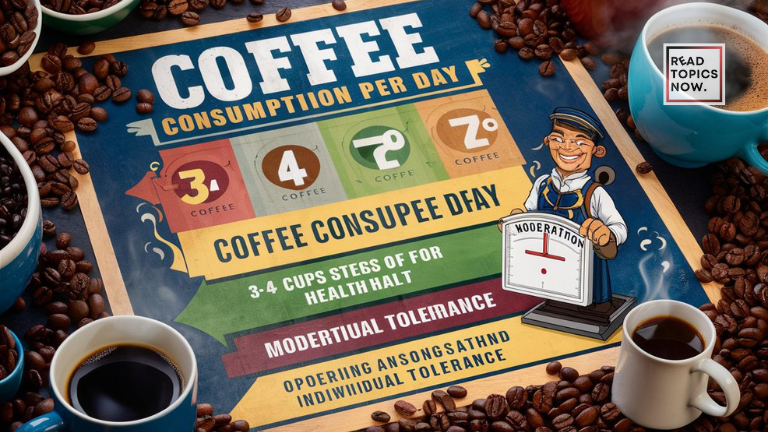
What is the Right Amount of Coffee Consumption Per Day

Coffee is a beloved beverage that provides an energy boost to millions of people worldwide. However, understanding the optimal amount of coffee and caffeine you should consume daily is crucial for maintaining your health and maximizing the benefits.
How Long Does Coffee Give You Energy?
Coffee is renowned for its stimulating effects, primarily due to its caffeine content. When you consume coffee, caffeine enters your bloodstream and travels to your brain, where it blocks the inhibitory neurotransmitter adenosine. This action results in increased neuronal firing and the release of neurotransmitters like dopamine and norepinephrine, enhancing alertness and energy levels.
Duration of Coffee’s Energy Boost
Typically, the energy boost from coffee begins within 15 minutes of consumption and peaks around 30 to 60 minutes. The effects can last anywhere from three to five hours, depending on individual sensitivity and tolerance to caffeine. Factors such as metabolism, age, and overall health can influence the duration and intensity of coffee’s effects.
How Many Coffees Should You Have a Day?

Determining the optimal number of coffee cups you should drink daily depends on various factors, including your caffeine sensitivity, lifestyle, and health conditions.
General Recommendations
- Moderate Intake: Most health experts recommend consuming no more than 3-4 cups of coffee per day, which roughly translates to 300-400 mg of caffeine. This amount is considered safe for the majority of healthy adults.
- Sensitive Individuals: If you are sensitive to caffeine, you may need to limit your intake to 1-2 cups per day. Symptoms of sensitivity include jitteriness, anxiety, and sleep disturbances.
- Health Conditions: Individuals with certain health conditions, such as heart arrhythmias or high blood pressure, should consult their healthcare provider to determine a safe level of coffee consumption.
How Many Cups of Coffee Should You Have a Day?
The number of coffee cups you should consume also depends on the caffeine content per cup, which can vary widely based on the type of coffee and preparation method.
Caffeine Content in Different Types of Coffee
- Brewed Coffee: Typically contains about 95 mg of caffeine per 8-ounce cup.
- Espresso: Contains about 63 mg of caffeine per 1-ounce shot.
- Instant Coffee: Usually has around 63 mg of caffeine per 8-ounce cup.
- Decaffeinated Coffee: Despite its name, decaf coffee contains a small amount of caffeine, roughly 2-5 mg per 8-ounce cup.
Recommended Daily Caffeine Intake
Health authorities suggest a daily caffeine limit of 400 mg for most adults. Exceeding this amount can lead to adverse effects such as insomnia, nervousness, restlessness, and a rapid heart rate.
Read: Health Benefits of Tea. Maintains Heart, Weight, Antioxidant
How Many mg of Caffeine Per Day?
Caffeine intake should be monitored to ensure it stays within safe limits. Here’s a closer look at the recommended daily caffeine intake:
Safe Caffeine Levels
- Healthy Adults: Up to 400 mg of caffeine per day is generally considered safe.
- Pregnant Women: It is advised to limit caffeine intake to 200 mg per day to avoid potential risks to the fetus.
- Adolescents: Should consume no more than 100 mg of caffeine per day, equivalent to one cup of coffee or two cans of caffeinated soda.
Monitoring Your Caffeine Intake
To track your caffeine consumption effectively, consider the following:
- Keep a daily log of all caffeinated beverages and foods consumed.
- Check product labels for caffeine content.
- Be mindful of hidden sources of caffeine, such as chocolate, certain medications, and energy drinks.
How Much Caffeine Should You Have Daily?
Finding the right balance in caffeine consumption is key to reaping the benefits of coffee without experiencing negative side effects.
Balancing Caffeine for Optimal Health
- Morning Consumption: Having your first cup of coffee in the morning can help kickstart your day. However, avoid consuming coffee too early, as it may interfere with the natural cortisol production that helps you wake up.
- Spacing Out Intake: Space your coffee intake throughout the day to avoid excessive caffeine buildup and potential side effects. A good rule of thumb is to limit coffee consumption to one cup every 3-4 hours.
- Avoid Late Afternoon Coffee: Drinking coffee late in the day can disrupt your sleep patterns. Aim to have your last cup of coffee at least six hours before bedtime.
Get Curated Post Updates!
Sign up for my newsletter to see new photos, tips, and blog posts.

I’m Prateek Katiyar, a passionate content writer with a knack for exploring diverse subjects. From tech trends to travel tips, and everything in between, I thrive on crafting engaging and informative content that captivates audiences.





